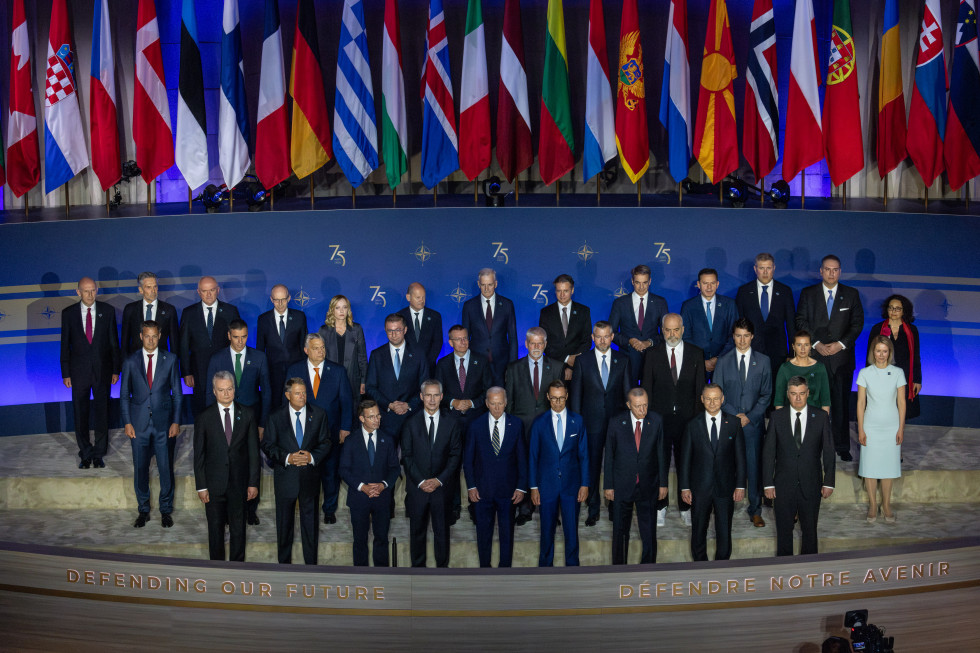Prime Minister Golob: "Our common goal is prosperity for the whole world"

Group photo at the 75th anniversary of the North Atlantic Treaty Organisation | Author NATO
The ceremony took place at the Andrew W. Mellon Auditorium, where the North Atlantic Treaty was signed on 4 April 1949 by Belgium, Canada, Denmark, France, Iceland, Italy, Luxembourg, the Netherlands, Norway, Portugal, the United Kingdom and the United States of America. The gathering was addressed by US President Joe Biden and NATO Secretary General Jens Stoltenberg, who stressed that NATO is the most successful and oldest alliance because it is an alliance of values. That is one of the reasons NATO will continue to stand by Ukraine and its just struggle for freedom and democracy.
After the ceremony, the Slovenian delegation attended a reception hosted by Iztok Mirošič, Ambassador of the Republic of Slovenia to Washington, for representatives of the Slovenian and American economic, political and cultural communities in the United States.
In his welcoming address, Prime Minister Golob thanked the Ambassador and all the Embassy’s staff for their efforts, which combine to further Slovenia's reputation in the United States of America and around the world. He highlighted Slovenia's long journey from independence to the present day, which marks the 75th anniversary of the Alliance and the 20th anniversary of Slovenia's NATO membership.
"Today we are celebrating not only the anniversary of the Alliance, but the friendship between our two nations," said the Prime Minister, adding that Slovenia is proud to be a non-permanent member of the United Nations Security Council for the second time in its young history – including with the support of the United States of America. "A country’s size and power are not important. The important thing is that we share a common goal, which is prosperity for the whole world," said Prime Minister Golob.
The Prime Minister continued his address by highlighting Slovenia's economic successes. "We have a bright future ahead of us. My thanks go to all of you who are preserving the Slovenian culture and identity in the United States of America, thus further deepening the ties between our two nations," concluded Prime Minister Golob.
This afternoon CET, Prime Minister Robert Golob, the Deputy Prime Minister and Minister for Foreign and European Affairs, Tanja Fajon, and the Minister of Defence, Marjan Šarec, will attend a meeting of the North Atlantic Council. Prime Minister Robert Golob and Minister of Defence Marjan Šarec will meet with the President of the Republic of Finland, Alexander Stubb. In the evening, Prime Minister Golob and Tina Gaber will attend a reception and dinner for the leaders of all the partner countries hosted by the President of the United States of America, Joe Biden, and his wife, Jill Biden, at the White House. Minister Fajon will attend a reception hosted by US Secretary of State Blinken, and Minister Šarec will attend a reception of Ministers of Defence hosted by US Secretary of State Austen.
Before the official start of the NATO Summit, Minister of Foreign and European Affairs, Tanja Fajon, took part in a roundtable discussion entitled 'Turning vision into action: women, peace and security across the Alliance'. "Women's participation significantly improves the results of peace negotiations. A peace agreement that includes women is 35 percent more likely to last at least 15 years. More women means more peace, which is why Slovenia strongly supports the Alliance's renewed policy on the Women, Peace, Security (WPS) Agenda, which will be endorsed at the NATO Summit in Washington. Our credibility depends to a large extent on how well we implement the Women, Peace, Security Agenda. The Alliance has the potential to take a leading role here and in Slovenia, which is a strong supporter of the WPS, we look forward to the realisation of this important agenda," said Minister Fajon on the sidelines of the roundtable.
Before the summit in Washington, Minister Šarec laid a wreath at the monument to the Unknown Soldier at Arlington Cemetery.
This year's NATO Summit marks the 75th anniversary of the Alliance, its key achievements and its current and future challenges.

